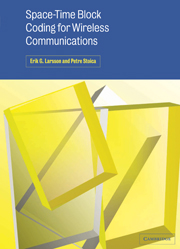Book contents
- Frontmatter
- Contents
- ABOUT THE AUTHORS
- PREFACE
- NOTATION
- COMMONLY USED SYMBOLS
- ABBREVIATIONS
- 1 INTRODUCTION
- 2 THE TIME-INVARIANT LINEAR MIMO CHANNEL
- 3 MIMO INFORMATION THEORY
- 4 ERROR PROBABILITY ANALYSIS
- 5 RECEIVE DIVERSITY
- 6 TRANSMIT DIVERSITY AND SPACE-TIME CODING
- 7 LINEAR STBC FOR FLAT FADING CHANNELS
- 8 LINEAR STBC FOR FREQUENCY-SELECTIVE CHANNELS
- 9 COHERENT AND NON-COHERENT RECEIVERS
- 10 SPACE-TIME CODING FOR INFORMED TRANSMITTERS
- 11 SPACE-TIME CODING IN A MULTIUSER ENVIRONMENT
- A SELECTED MATHEMATICAL BACKGROUND MATERIAL
- B THE THEORY OF AMICABLE ORTHOGONAL DESIGNS
- REFERENCES
- INDEX
10 - SPACE-TIME CODING FOR INFORMED TRANSMITTERS
Published online by Cambridge University Press: 31 October 2009
- Frontmatter
- Contents
- ABOUT THE AUTHORS
- PREFACE
- NOTATION
- COMMONLY USED SYMBOLS
- ABBREVIATIONS
- 1 INTRODUCTION
- 2 THE TIME-INVARIANT LINEAR MIMO CHANNEL
- 3 MIMO INFORMATION THEORY
- 4 ERROR PROBABILITY ANALYSIS
- 5 RECEIVE DIVERSITY
- 6 TRANSMIT DIVERSITY AND SPACE-TIME CODING
- 7 LINEAR STBC FOR FLAT FADING CHANNELS
- 8 LINEAR STBC FOR FREQUENCY-SELECTIVE CHANNELS
- 9 COHERENT AND NON-COHERENT RECEIVERS
- 10 SPACE-TIME CODING FOR INFORMED TRANSMITTERS
- 11 SPACE-TIME CODING IN A MULTIUSER ENVIRONMENT
- A SELECTED MATHEMATICAL BACKGROUND MATERIAL
- B THE THEORY OF AMICABLE ORTHOGONAL DESIGNS
- REFERENCES
- INDEX
Summary
All the discussion so far in this book (with the exception of Sections 3.3 and 6.1) has focused on the case when the channel is unknown to the transmitter. In this chapter, we will briefly study how partial channel knowledge at the transmitter can be used to improve the system performance. In particular we will study linearly precoded STBC.
Introduction
If the transmitter knows the channel, then it is optimal from an error probability point of view to use what we referred to in Section 6.1 as beamforming. In the case of one receive antenna (nr = 1), beamforming amounts to transmitting a symbol weighted by the conjugate transpose of the channel, h* (for nr = 1, H becomes a row vector hT). Although doing so might lack the interpretation of beamforming in a strict physical sense (depending on the antenna configuration), it shares the main signal processing attributes thereof.
For a given transmit power, the performance obtained via transmit diversity using STBC is in general inferior to that of beamforming, or receive diversity, by a factor that is sometimes called the “array gain.” Loosely speaking, this is so since space-time coding methods spread power uniformly in all directions in space, while beamforming uses information about the channel to steer energy in the particular direction of the receiver.
Information
- Type
- Chapter
- Information
- Space-Time Block Coding for Wireless Communications , pp. 212 - 222Publisher: Cambridge University PressPrint publication year: 2003
